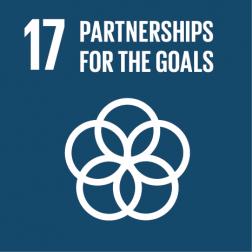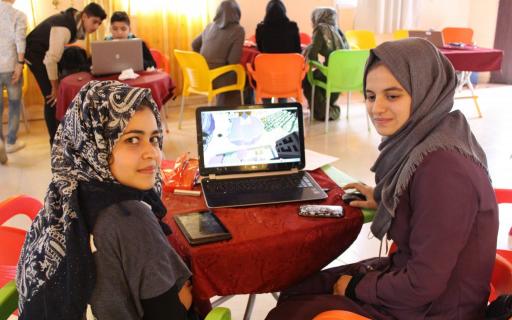The context
Since the end of the Cold War, some development assistance has been conditional upon the governments of partner countries respecting human rights. More recently, the concept of approaching development based on human rights has proposed strengthening the capacities of the authorities responsible for monitoring human rights on the one hand, and the capacities of those able to enforce them on the other.
 In 2015, at the United Nations General Assembly, Belgium undertook to achieve the 17 Sustainable Development Goals (SDGs) aimed at ending poverty, protecting the planet and ensuring universal well-being by 2030. To realise this sustainable development programme, we need to mobilise new energy and tap into new technological possibilities. As such, digitisation plays an important role in achieving the SDGs.
In 2015, at the United Nations General Assembly, Belgium undertook to achieve the 17 Sustainable Development Goals (SDGs) aimed at ending poverty, protecting the planet and ensuring universal well-being by 2030. To realise this sustainable development programme, we need to mobilise new energy and tap into new technological possibilities. As such, digitisation plays an important role in achieving the SDGs.
Our motivation comes from a simple observation which has resulted in a vision.
Digitisation has profoundly changed our societies, for instance by creating models of production or consumption that were inconceivable just ten years ago, by facilitating democratic participation and citizen engagement, or by turning our planet into a global village. Our vision is that this progress will become universally accessible within the next five years.
In this regard, the Digital for Development policy therefore does not consider digitisation as a goal in itself, but as a cross-cutting tool to achieve better results for more people who are in need.
We believe that if Belgian development cooperation does not take into account the opportunities related to digitisation, it will run the risk of excluding its partners from the dividends of digitisation.

The solutions
This is why, along with other initiatives, we have integrated the digital component into the call for projects "Human Rights and Digitisation", as we are convinced of its potential added value for the success of projects which are designed to promote and/or protect human rights. This call was launched on 8 April 2016 in four of our partner countries: the Democratic Republic of Congo, Rwanda, the Palestinian Territories and Tanzania.
The selected projects needed to be based, firstly, on an analysis of human rights in the country in question, and secondly on an analysis of the potential (and inherent risks) that digital technology, as a vector of change, could bring.
As regards the digital component, at least two of the following three elements needed to be incorporated by the candidate project:
- Multiplier effect: the use of ICT tools to maximise access and the impact of the intervention;
- Threshold: the use of ICT tools to overcome obstacles and facilitate access to rights for vulnerable groups such as women, minority groups, the poorest, etc.
- Adaptability: adapting ICT to the local context to ensure a significant multiplier effect and/or a lower threshold for access in the local context.

The final selection was based on the following criteria:
- The positive impact of the project on the beneficiaries (especially vulnerable groups), particularly in terms of strengthening rights holders with the aim of greater participation;
- The use of digital technology in a transformational or innovative way to approach the issue differently, and maximise the impact of the project;
- The necessity and relevance of the project in promoting/protecting human rights, in particular by taking into account the context of the country.
Four projects were ultimately selected in three of our partner countries: Democratic Republic of Congo (1 project), the Palestinian Territories (1 project) and Tanzania (2 projects).
The result
Democratic Republic of Congo
As an NGO with expertise in local capacity development and legal and judicial assistance for victims of serious human rights violations, TRIAL is strengthening the efforts of Congolese actors in the fight against impunity on the part of those responsible for international crimes. In this sense, it focuses its action on the three strands which underpin the fight against impunity: punishing those responsible; upholding the victims' right to know the truth and obtain compensation; and enabling the authorities to fulfil their mandate as a public authority that guarantees public order. By supporting a combination of measures adapted to the context, which are intended to promote access to justice for victims of international crimes, as well as local capacity development, TRIAL is an important actor in the fight against impunity in the DRC.
For further information:
- Finally, justice for the girls from Kavumu who were raped!
- Videos to combat mass crimes
Palestinian Territories
The United Nations Human Settlements Programme (UN Habitat) uses the video game Minecraft, which is a kind of digital Lego that allows players to build a three-dimensional environment. In effect, Minecraft has been a powerful tool at the global level in involving disadvantaged young people in the development projects of their city. By supporting this initiative in the Palestinian Territories, Belgium wanted to make Gaza a pleasant place for young people. By asking young people to think about the future of their city, mobility and security in the Palestinian Territories are at the heart of their concerns.
For further information:
- Rebuilding Gaza with Minecraft
Tanzania
- "Enabling Improved Governance and Accountability in Tanzania through digital technology" by Oxfam Solidarity. The aim of this project is to help strengthen the social responsibility and accountability of the Tanzanian authorities vis-à-vis their citizens via modern and innovative digital technologies. The project is under development in Kasulu district, near Kibondo.
- "Mapping the socio-economic and human rights situation of artisanal and industrial mining in northwest Tanzania" by the International Peace Information Service - IPIS. This project, implemented in partnership with Enabel, the Belgian Development Agency, involves the digital mapping of the socio-economic situation and respect for human rights in the artisanal and industrial mining sector in northwest Tanzania.
Resources
- Pictures : © UNAMID - © World Bank / Arne Hoel - © United Nations - © Global partnership for Education - © IRD / Sylvie Breteloup
- Strategic Note Digital for Development (D4D) for the Belgian Development Cooperation
Partners
- In DRC : NGO Trial International
- In Palestinian Territories: UN-Habitat
- In Tanzania : NGOs IPIS et Oxfam Solidarité



